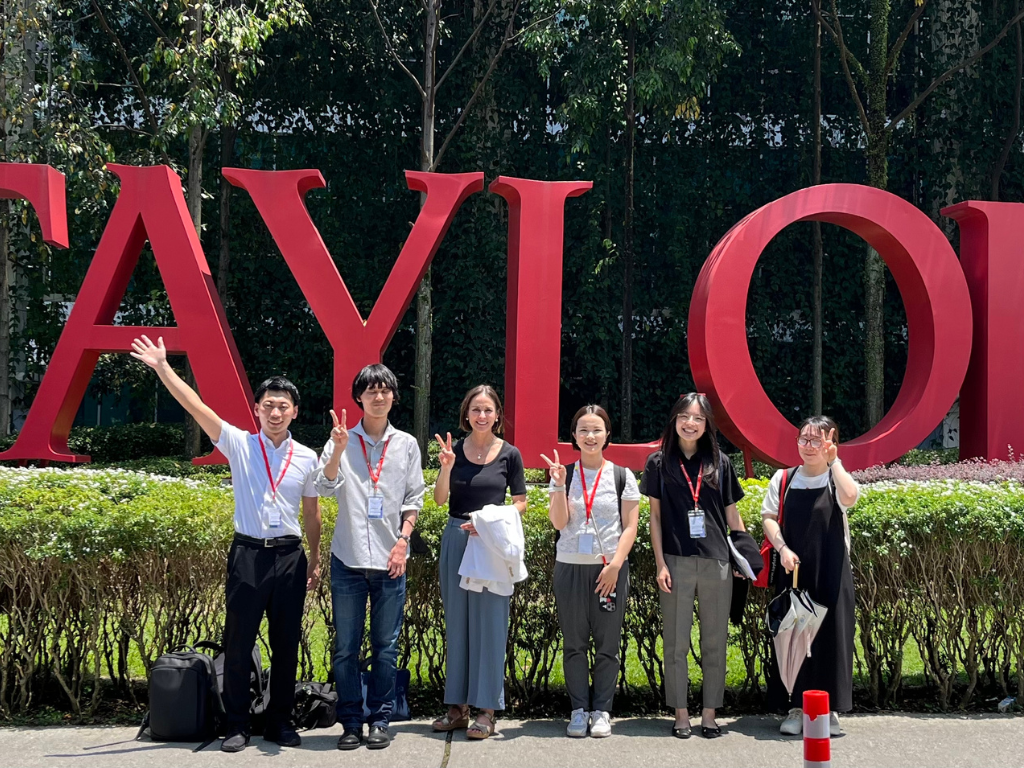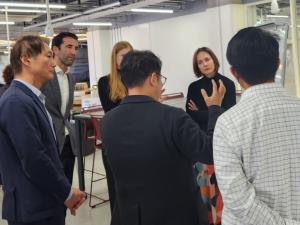
UNC-Chapel Hill’s Associate Provost for Global Affairs Heather Ward returned to Japan in January 2024, weeks after a UNC delegation’s groundbreaking visit there. While in Japan, she helped launch a five-year initiative, which aims to strengthen ties between U.S. and Japanese universities.
UNC is a named partner in the 2023-2028 Inter-University Exchange Project (IUEP), funded by Japan’s Ministry of Education, Culture, Sports, Science and Technology (MEXT). For this funding cycle, MEXT has supported the creation of the Japan-hub for Innovative Global Education (JIGE), which is co-led by Chiba, Kansai and Tohoku Universities in Japan. JIGE comprises 31 international university partners, including UNC. At the JIGE kick-off symposium in Osaka, Ward delivered a keynote address.
“It is an exciting time for innovation in global education, and we are all fortunate to have JIGE as a resource,” Ward said during her presentation. “Crossing international borders alone does not equip students with global knowledge, skills or abilities. Those come only from the intentional design of the learning opportunity, whether that learning is online, in the classroom or in another country.”
Ward described UNC’s successful Collaborative Online International Learning (COIL) program as an example of this intentional design. At Carolina, faculty have developed 91 COIL courses, across eight schools and 26 academic departments.

Over the next five years, JIGE will provide training, technology platforms, learning modules and funding for universities in Japan to expand global education and develop a workforce that is prepared for the future. Japanese universities are expected to collaborate with American universities to design courses (such as COIL courses), internships, study abroad opportunities and global learning that involves both COIL and study abroad. According to Ward, this is an excellent time for Carolina faculty who are interested in developing COIL courses with Japanese universities.
JIGE is part of a wider effort by the Japanese government to strengthen its higher education system and encourage innovation. Last year, MEXT announced a new university endowment fund equivalent to $68 billion to transform its higher education system. Tohoku University is the first recipient of the investment.
Officials continue to renew their commitment to the historic alliance between Japan and the U.S., and closer collaboration in higher education and research is one of many ways they have expressed that. In April 2021, U.S. President Joe Biden and then-Japanese Prime Minister Suga Yoshihide released a joint statement, which read, in part, “Our historic partnership is essential to the safety and prosperity of both our peoples. Forged in the wake of strife, the alliance has become a bedrock to each of our nations. The world has changed many times over; our ties have pulled tighter.”
The ties that bind Japan and the U.S. are felt deeply in North Carolina. Japan remains the top investor to the state, and North Carolina shares many challenges with Japan, such as aging populations, pandemic preparedness and coastal vulnerability. Engagement with Japan presents opportunities to solve shared global challenges together.
In addition to speaking at the JIGE kick-off symposium in Osaka, Ward was invited to speak at the U.S. launch on Feb. 21. Japanese and U.S. leaders in higher education gathered at the Embassy of Japan in Washington, D.C.
“By participating in the JIGE initiative we get to showcase Carolina’s excellence in global education, like COIL, as a model to universities across Japan, the U.S. and the world,” she said.
Ward’s participation in JIGE is the result of UNC’s commitment to increased collaboration with Japan, and colleagues in the OVPGA recognize the potential collaboration created by recent initiatives such as JIGE.
“We spot opportunities to engage with university partners around the world. That is core to the mission of the OVPGA,” said Krista Northup, UNC’s director of global partnerships, who joined Ward at the JIGE event in Washington, D.C. “Strengthening our partnerships throughout Japan has provided an opportunity for Carolina faculty and students to lead and grow.”
To further her engagement, Ward traveled to Kuala Lumpur, Malaysia, at the end of February to co-lead a symposium on higher education internationalization and innovation. Those in attendance included university representatives from Japan and throughout Southeast Asia.
When asked why she has dedicated much of her work to enhancing engagement with Japan, Ward said, “When Japan’s premier universities think of a good partner — with academic excellence and groundbreaking research — we want them to think of Carolina.”
By Joshua K. Jennings, UNC Global Affairs
